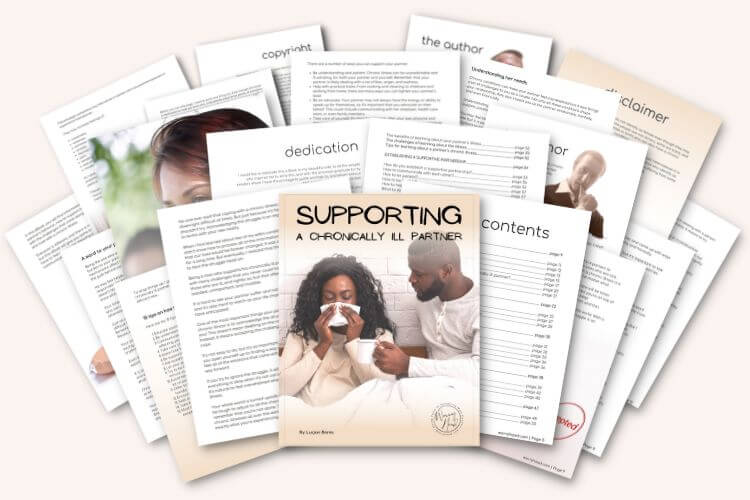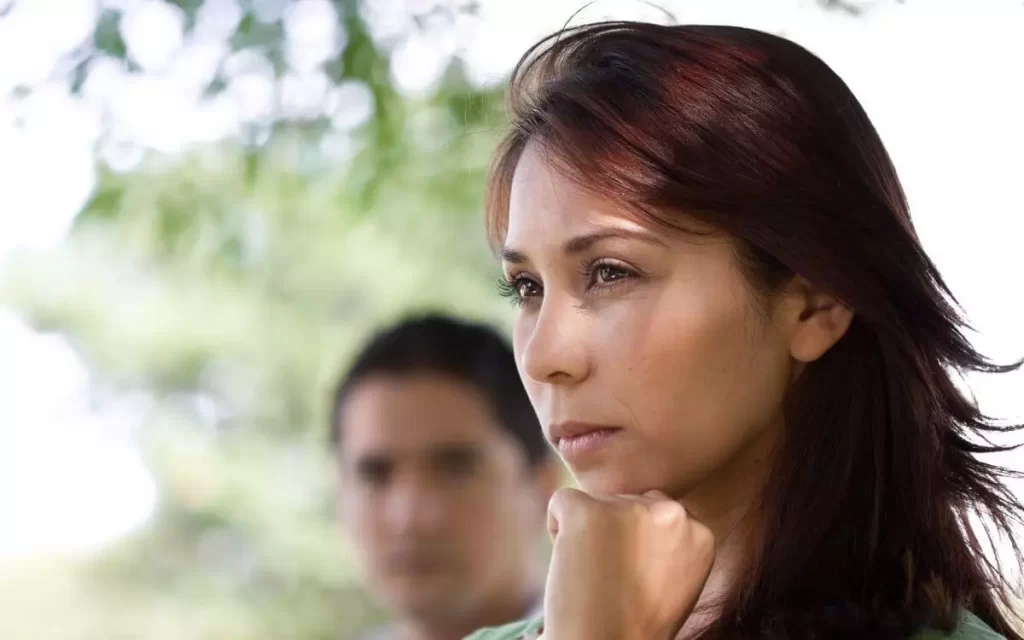How to acknowledge having a chronically ill partner?
It can be difficult to acknowledge having a chronically ill partner. You may feel like you are the only one who supports them and that they are constantly sick. However, it is important to remember that your partner is still the same person you fell in love with, despite their illness. There are ways you can be supportive and acknowledge their condition.
Quick tips I can give you from the start include the following:
- Firstly, educate yourself about their illness. This will help you better understand what they are going through and how you can help them.
- Secondly, be patient and understanding with them. They may not be able to do everything they used to do, but they still need your support.
- Lastly, communicate with them openly about their illness and how it affects your relationship. This will help you both understand each other’s needs and find a way to work through any challenges.
If you are struggling to acknowledge your partner’s chronic illness, reach out to a therapist or counselor who can help you process your feelings. Remember, you are not alone in this. There are many resources and support groups available to help you both navigate this new reality. This blog is one of them.
Acknowledging the struggle.
Chronic illness doesn’t just impact the person suffering. It also affects those closest to them, especially their romantic partner. If you are in a relationship with someone with a chronic illness, you may be wondering how to best support them.
It can be difficult to see the person you love suffer and feel helpless. You may feel like you are the only one who understands and supports them. However, it is crucial to remember that your partner is still the same person you fell in love with, despite their chronic illness. There are ways you can be supportive and acknowledge their condition.
Acknowledging the struggles of your partner can be difficult, but it is an important part of being supportive. Your partner is likely dealing with a lot of different emotions and may feel like they are no longer the person they used to be. It’s important to acknowledge these feelings and to let your partner know that you are still there for them.
Talking about acknowledging the struggle, if you want to learn how to cope with your partner’s chronic illness, how to support her struggles, and manage a relationship with a chronic condition, I give away a FREE Chapter of my eBook: “Supporting a Chronically Ill Partner”.
This chapter alone has all the exact information on acknowledging the struggle, such as:
- A word to your partner.
- A word to you.
- Stepping on eggshells.
- Understanding her needs.
- How to acknowledge having a chronically ill partner?
- Acknowledging can be hard.
- 15 tips on how to do it!
Get the 1st Chapter FREE!
Chronic Illness for Partners

There are a few things you can do to support your partner…
- Listen to them. Just being there to listen to your partner can be a big help. Let them talk about their feelings, and don’t try to fix everything.
- Help with practical things. If your partner is having a hard time with everyday tasks, offer to help out. This can take some of the pressure off them, and let them know you are there to help.
- Do things together. Spending time together can be a great way to connect, even if you’re not doing anything special. Just being in each other’s company can be a comfort.
There are also a few things you should avoid doing…
- Don’t ignore the problem. It can be tempting to pretend everything is fine, but this will only make things worse in the long run. Acknowledge that there is a problem, and talk about it openly.
- Don’t be overbearing. It’s important to offer support, but you shouldn’t try to take over everything. Your partner still needs to feel like they are in control of their own life.
- Don’t be dismissive. It’s important to take your partner’s feelings seriously, even if you don’t understand them. Invalidating their emotions will only make them feel worse.
Acknowledge the new situation.
To acknowledge a new situation in life is to accept it. This can be a difficult process, but it is an important step in moving forward. The first thing to do is take some time to yourself. This may mean taking a few days off from work or spending some time alone in nature.
It is important to allow yourself time to grieve the loss of the former relationship. This doesn’t mean that you have to forget about your partner, but it does mean giving yourself time to adjust to the new reality.

Be helpful!
One of the best things you can do for your partner is to be helpful. This doesn’t mean doing everything for them, but it does mean lending a hand when needed. There are many ways to be helpful, such as:
- helping with chores
- running errands
- providing emotional support
- being a listening ear
It is also important to respect your partner’s wishes. If they don’t want help, respect their wishes and give them space.
Despite two chronic conditions – endometriosis and fibromyalgia – my wife is still a very independent woman. Sure, she needs my support when the flare-ups take over, but she doesn’t want to be a burden to me and does her best to relieve me of extra duties.
Chronically ill people don’t want to rely on others, they need help when they can’t cope, but knowing that they’re a burden to someone takes away their dignity.
Acknowledge your partner’s feelings. Chronic illness can be very isolating. Your partner may feel like they’re the only one going through this. It’s important to acknowledge their feelings and let them know that you’re there for them.
Cope with emotions.
Chronic illness can bring up a lot of difficult emotions. It is important to acknowledge these emotions and find healthy ways to cope with them. Some helpful coping mechanisms include:
- journaling or blogging
- talking to a therapist
- spending time with friends and family
- getting involved in supportive online communities
It is also important to find ways to take care of yourself. This may include:
- exercise
- relaxation techniques
- healthy eating
Coping with your own emotions, especially if you are a man, can be difficult. It is important to reach out for help if you are struggling. Your emotions will vary. From feeling grief, confusion, loneliness, sadness, frustration, anger, and even resentment, you may feel all of these at some point.
Your partner is likely to have good days and bad days…
When your partner is having a good day, try to enjoy it and not focus on the bad days. Try to do things together that you both enjoy. On the bad days, try to be understanding and patient. Offer support and assistance, but also respect your partner’s wishes. If they need space, try to give it to them.
Chronic illness can be difficult for both partners in a relationship. It is important to acknowledge your own needs and emotions, while also being supportive of your partner. Try to focus on the good days and be understanding on the bad days.
If you are struggling, reach out for help, don’t be a hero, be helpful, but don’t try to fix everything. That is my advice for you.
Practice self-care.
Self-care for men is especially important when their partner is chronically ill. This means making time for activities that relieve stress, such as exercise, hobbies, or spending time with friends. It’s also important to get regular checkups and screenings, even if you feel healthy.
Taking care of yourself is knowing how to acknowledge having a chronically ill partner.
Self-care comes difficult for men. This is because they are used to being the provider and protectors in relationships. When their partner is sick, they can feel helpless and may even blame themselves.
It’s important for men to remember that they are not responsible for their partner’s illness. They can’t “fix” it and they can’t cure it. The best thing they can do is be supportive.
Self-care means making time for yourself in order to relieve stress because chronic stress and doing things for your loved one without looking after your own needs leads to burnout. When you reach that point, you won’t be any good to anyone, least of all yourself.
So acknowledge having a chronically ill partner by making time for yourself in order to stay mentally and physically healthy for both you and your partner.

Acknowledge having a chronically ill partner.
What will help you both understand each other’s needs and find a way to work through any challenges is communication.
Chronic illness can be a lonely experience, so it’s important to let your partner know that you’re there for them. This means being an active listener, asking questions, and really trying to understand what they’re going through.
There’s no easy way, but there is no one “right” way either. Every person and every relationship is unique, and there is no one-size-fits-all approach to dealing with chronic illness in a relationship. However, there are some things you can do to help make things easier for both yourself and your partner.
One of the most important things you can do is to educate yourself about your partner’s condition. This will not only help you better understand what they are going through, but it can also give you a better sense of how to best support them.
Additionally, try to be as understanding and patient as possible. It’s important to remember that chronic illness can be unpredictable and flare-ups can happen at any time.
Finally, be sure to communicate openly with your partner about their illness and how it is affecting your relationship. This can be a difficult topic to discuss, but it is important to make sure that both of you are on the same page.
To wrap things up, I give you a list of 15 tips on how to acknowledge having a chronically ill partner, it’s going to help you support your partner in a more efficient way…
15 tips on how to acknowledge having a chronically ill partner.
- Educate yourself about your partner’s condition.
- Be understanding and patient.
- Communicate openly with your partner about their illness and how it is affecting your relationship.
- Take care of yourself.
- Make time for yourself.
- Be supportive.
- Ask questions and really try to understand what they’re going through.
- Let your partner know that you’re there for them.
- Try to be flexible and understanding when plans need to change at the last minute due to a flare-up or other unexpected event.
- Avoid taking things personally if your partner is having a bad day or is in a lot of pain.
- Offer to help with tasks or errands, but don’t take on more than you can handle.
- Encourage your partner to talk about their feelings and experiences.
- Seek out support from others who are in similar situations.
- Take breaks as needed, both for yourself and for your partner.
- Most importantly, remember that you are not alone in this. There are many people who understand what you’re going through and are here to help.
If you or your partner are struggling to cope with chronic illness, please seek out professional help. There are many resources available to assist you, and talking to a therapist or counselor can be extremely helpful.
In the meantime, let’s meet in the comments section below, if you have any questions, or advice of your own on how to acknowledge having a chronically ill partner, don’t hesitate to express them.
Take good care of one another!
Get the 1st Chapter FREE!
Chronic Illness for Partners



About Me
Hi, I’m Lucjan! The reason why I decided to create this blog was my beautiful wife, who experienced a lot of pain in life, but also the lack of information about endometriosis and fibromyalgia for men…
